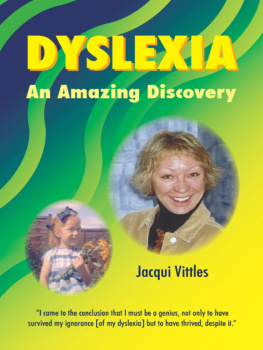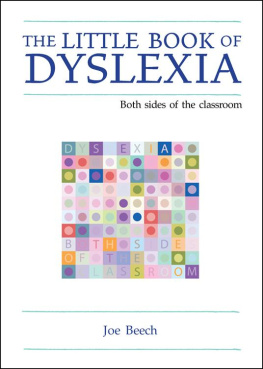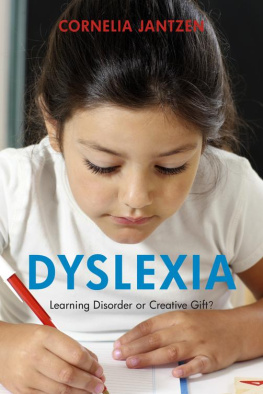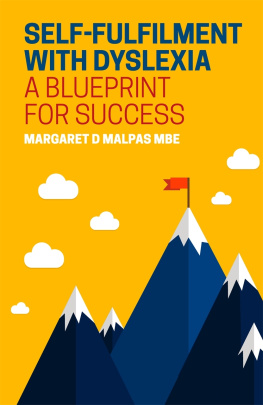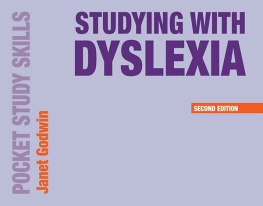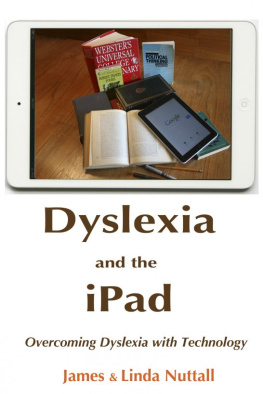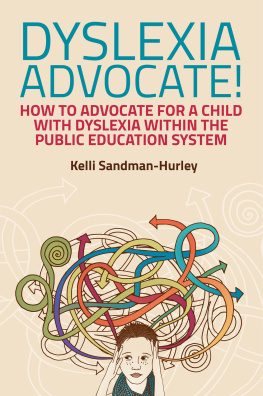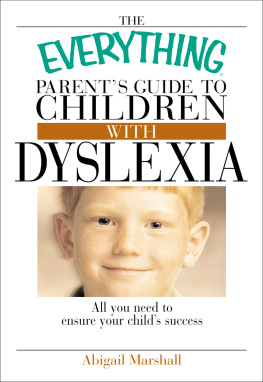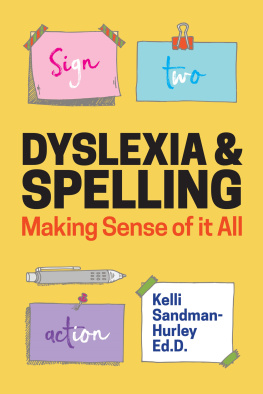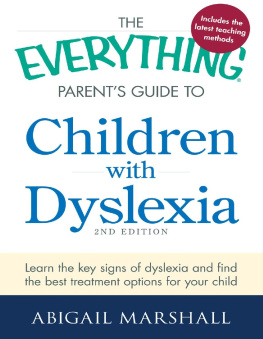Jacqui Vittles - Dyslexia: An Amazing Discovery
Here you can read online Jacqui Vittles - Dyslexia: An Amazing Discovery full text of the book (entire story) in english for free. Download pdf and epub, get meaning, cover and reviews about this ebook. year: 2011, publisher: Publish on Demand Global LLC, genre: Non-fiction. Description of the work, (preface) as well as reviews are available. Best literature library LitArk.com created for fans of good reading and offers a wide selection of genres:
Romance novel
Science fiction
Adventure
Detective
Science
History
Home and family
Prose
Art
Politics
Computer
Non-fiction
Religion
Business
Children
Humor
Choose a favorite category and find really read worthwhile books. Enjoy immersion in the world of imagination, feel the emotions of the characters or learn something new for yourself, make an fascinating discovery.
- Book:Dyslexia: An Amazing Discovery
- Author:
- Publisher:Publish on Demand Global LLC
- Genre:
- Year:2011
- Rating:3 / 5
- Favourites:Add to favourites
- Your mark:
- 60
- 1
- 2
- 3
- 4
- 5
Dyslexia: An Amazing Discovery: summary, description and annotation
We offer to read an annotation, description, summary or preface (depends on what the author of the book "Dyslexia: An Amazing Discovery" wrote himself). If you haven't found the necessary information about the book — write in the comments, we will try to find it.
A personal account of what it is like to suffer from Dyslexia.
Dyslexia: An Amazing Discovery — read online for free the complete book (whole text) full work
Below is the text of the book, divided by pages. System saving the place of the last page read, allows you to conveniently read the book "Dyslexia: An Amazing Discovery" online for free, without having to search again every time where you left off. Put a bookmark, and you can go to the page where you finished reading at any time.
Font size:
Interval:
Bookmark:
Copyright 2009
All rights reservedJacqui Vittles
No part of this book may be reproduced or transmitted in any form or by any means, graphic, electronic, or mechanical, including photocopying, recording, taping, or by any information storage retrieval system, without the permission, in writing, from the publisher.
Eloquent Books
An imprint of Strategic Book Group
P.O. Box 333
Durham CT 06422
www.StrategicBookGroup.com
ISBN: 978-1-61897-094-7
Printed in the United States of America
Book Design: Suzanne Kelly
those people yet to discover
their gift, and to all those who
live or work with them.
I give my humble and heartfelt gratitude to my husband, who remains a constant source of inspiration and support for my efforts; to my sons, for their patience, generosity and for believing in me; to Ali, Pavel, Phil, Phil, Cris, Grant, Jo, Robin, Penelope and Lynn for their invaluable contributions and constant encouragement; to Joy for keeping my fingers tapping on the keys and guiding me through the morass; and to Irina, who sowed the seed that got me to commit my story to paper in the first place.
I give my humble and heartfelt apologies to anyone who ever asked me to read a text bookand expected me to learn something from it!
An Amazing Discovery
This book is not about dyslexia. This book is about my experience of being dyslexic and not knowing. It is about my personal journey struggling without realising it and how I came to discover what wasor wasntactually wrong with me. Having already held down high-powered management jobs, gained an MBA and run my own business, I made the life-changing discovery. It felt like emerging from a dark tunnel into the light for the very first time.
As I now know, dyslexia is a much-misunderstood condition. For a start, it isnt an illness that can be cured and therefore it doesnt have medical symptoms. What it does have is a series of characteristics that can be both inconsistent and challenging. The term word-blindness is often used as short-hand for describing the condition, but as I discovered, this is misleading. In fact, it represents only a fraction of those characteristics that join together to form the condition we know as dyslexia. Although I have displayed many of those characteristics throughout my life, traditional word-blindness has never really been one of them. I am also of above-average intelligence and these two factors together militated against my discovering that my little problems have a nameuntil I was in the latter half of my forties.
I am not an expert in the condition of dyslexia but I am expert in my own experience of it. My primary motivation in writing this book is in helping others, like myself, to put a name to something theyve been aware of all their lives. In sharing my experiences in this way Im also hoping that people who do not have dyslexia may increase their understanding of what it is and how it can affect other people who may be very close to them.
As well as looking at my own experience of the condition, I have also listened to other people with dyslexia and learnt a great deal more from hearing their stories; and I have discovered that some very famous people are dyslexic, or were during their lifetime. Finally, I have included some information about where readers might be able to go for help if this book has had some resonance for them.
We are learning more and more about dyslexia with each passing year and having the condition is nothing to be ashamed of or hidden away. I hope you enjoy reading this book. If you feel so inclined, please recommend it to someone else who may be interested in this complex and widely misunderstood condition and who may, in turn, go on to share a newfound understanding with others.
My husband Paul and I would often wander into town on a Saturday and have a browse through the bookshops. Paul would always head for the management and motivation sections while I would usually have a look through the sales tables or the display stands with the new releases and books on special promotion, then wed go for a coffee before making our way back home again.
This particular Saturday was no different. Paul made his way to his favourite section while I ambled towards a table piled high with books on special offer. On one corner of the table was a stack of books about how to train your recalcitrant dog not to chew your furniture, and next to that was a large tome extolling the delights of Chinese cooking for people with no time to cook. I was being invited to brush-up my French in five easy stages and advice on making the best of my somewhat middle-aged looks was jockeying for position with guidance on successfully completing a new, quick and easy ten-point detox plan. Sitting proudly in the centre was a huge pile of autobiographies by someone with an unpronounceable name whom, clearly, no-one wanted to read about. Then, tucked away, partially obscured by our erstwhile luminary, I spotted a medium-sized paperback book sporting a black, white and red cover which announced The Gift of Dyslexia.
I was intrigued as to how dyslexia could be described as a gift and picked up the book, almost as a reflex action. I knew there had been studies linking dyslexia with young people with behavioural problems, and I also knew there was anecdotal evidence to suggest that dyslexia is present in a significant proportion of the prison population. I had always believed dyslexia to be a learning disability found particularly amongst people with low IQ and had never really given it a lot of thought beyond these scant few details.
On impulse, I began to read the book. This was most unusual because of my discomfort in reading in a public place, albeit to myself. It was as if the book was willing me to read it. The pages were drawing me to them, beginning with a simple list of the abilities that dyslexics share. I saw highly intuitive and perceptive and I thought, yes, I can identify with that. Being able to think using all the senses. Thinking in pictures doesnt everyone? Vivid imagination. All these things, the book told me, add up to non-verbal thought. The opposite is linear thought, which is the way language is structured and the way we learn, using sequences and lists. Some pages whispered to me, some shouted at me. They all said something that struck a chord for me.
I stopped reading and looked up. All around me, people were going about their business oblivious of the miracle that was unfolding there, before them, in the middle of that bookshop. Slowly, I raised the book and resumed my reading. My mind flashed a picture of an Alice in Wonderland room with doors lining the walls. The doors opened as I looked at them and bright lights shone from the rooms behind. I relaxed my shoulders as a wave of euphoria washed over me. With a huge sense of relief and a beaming smile, I realised Im not lazy, Im not dim or stupid Im dyslexic!
I was 46 and I felt the weight of the world lifting from my shoulders. The final piece of lifes jigsaw puzzle had gently fallen into place. I no longer had to search for excuses because I had an explanation. Id had no idea that my little problem had a name. Not only was I not stupid, I was a genius for getting this far, unknowingly developing complex and effective coping strategies that had allowed me to function in a world that people without dyslexia take in their stride. I had positively thrived, against all the odds. As I stood in the middle of the bookshop with all the world going about its business, I realised theres nothing wrong with my brain; its just wired differently so that information is processed in a different way. All these years Ive had to
Font size:
Interval:
Bookmark:
Similar books «Dyslexia: An Amazing Discovery»
Look at similar books to Dyslexia: An Amazing Discovery. We have selected literature similar in name and meaning in the hope of providing readers with more options to find new, interesting, not yet read works.
Discussion, reviews of the book Dyslexia: An Amazing Discovery and just readers' own opinions. Leave your comments, write what you think about the work, its meaning or the main characters. Specify what exactly you liked and what you didn't like, and why you think so.

